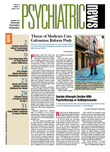APA has told the House Ways and Means Subcommittee on Health that the government must do a better job protecting beneficiaries in the Medicare Part D program, especially “dual eligibles” with mental illness. Dual eligibles are those who qualify for both Medicaid and Medicare; their prescription coverage was shifted into Medicare Part D at the plan's onset at the start of 2006.
In written testimony submitted to the subcommittee, APA outlined the dramatic findings of a study by the American Psychiatric Institute for Research and Education (APIRE) of the troublesome effects of the transition from Medicaid to Part D on dual eligibles with mental illness.
The results of the first four months of that study were announced in May at a press conference in Washington, D.C., and published in the May American Journal of Psychiatry. Data from the remainder of the year were reported at APA's 2007 annual meeting in May (Psychiatric News, May 18 and July 20).
In the testimony delivered to the subcommittee on health last month, APA told representatives that more than half of the dual-eligible psychiatric patients studied had at least one problem with medication access or continuity since Part D began.
“These patients were not able to access medication refills or new prescriptions, or they discontinued or temporarily stopped their medications as a result of the changes in the coverage and management of prescription drug benefits,” according to APA's testimony.
The testimony also highlighted these findings from the APIRE study:
•
Approximately 43 percent of patients could not access medication refills or new prescriptions in 2006.
•
28 percent were previously stable but had to switch to a different medication than the one clinically preferred.
•
28 percent had problems accessing benzodiazepines; of these, 38 percent ended up being hospitalized.
•
29 percent had medications discontinued or temporarily stopped in 2006 due to administrative, benefit-management, or coverage issues.
•
69 percent with medication-access problems experienced a significant adverse clinical event, such as an emergency-department visit, hospitalization, homelessness, or being detained/incarcerated in a jail or prison, compared with 40 percent of beneficiaries with no medication-access problems.
•
41 percent with medication-access or continuity problems had an emergency-department visit, compared with 26 percent for those with no access problems.
“APA is deeply concerned that patients unable to access psychotropic medications will suffer serious consequences,” the Association emphasized. “When mental disorders such as schizophrenia, bipolar disorder, or major depression are inadequately treated, the risk for loss of function, hospitalization, comorbid medical conditions, and mortality is substantially elevated.”
APA urged Congress to work with the Centers for Medicare and Medicaid Services (CMS) to make the following changes:
•
CMS must fully enforce policies ensuring that patients who are clinically stable on their medications and/or dosage receive Part D coverage for these medications. In particular, utilization-management efforts by drug-plan administrators must not present a barrier to access for necessary medications.
•
Congress should amend the Part D statute to include coverage of benzodiazepines. Their exclusion makes no sense from a clinical or health-policy perspective and has resulted in unnecessary hardships for patients enrolled in Part D.
•
The guidance issued by CMS requiring Part D drug plans to cover “all or substantially all” medications in six classes of clinical concern (including antipsychotics, antidepressants, and anticonvulsants) must be codified into law. Unbalanced coverage of these medications would greatly impact enrollment, as well as the success and functionality of all drug plans.▪
